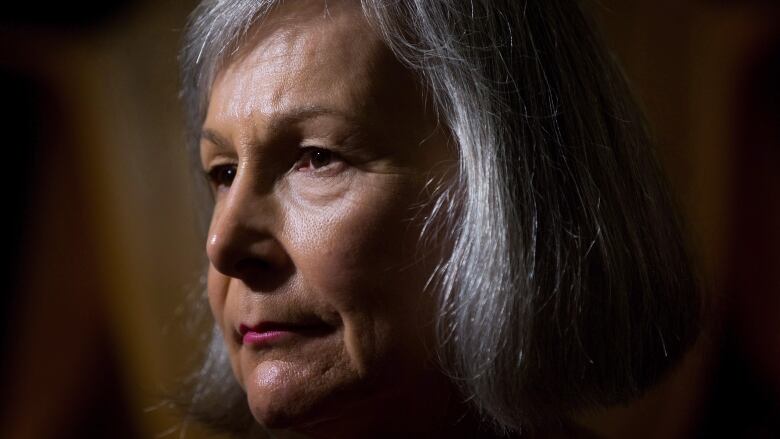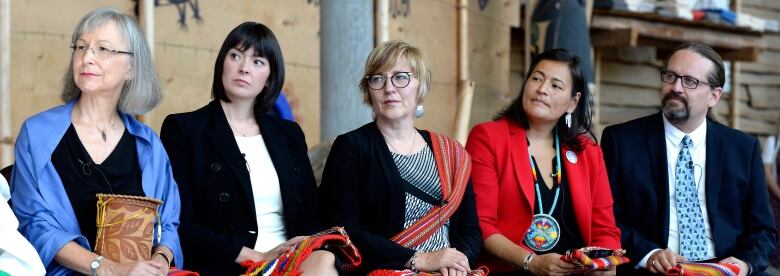MMIWG chief commissioner still has 'hope' despite rocky start
Inquiry has been rocked by poor communications, revolving door of staff, cancelled meetings

The chief commissioner of the inquiry into missing and murdered Indigenous women and girls says the criticism the inquiry has receivedover its progress so far is not the result of a leadership or staffing deficiency but rather a failure to communicatethe "tremendous work" it has already accomplished.
Chief commissionerand former B.C. judge Marion Bullermade the comments Friday after prominent Indigenous leaders and grassroots activists penned a strongly worded letter this week callingon Bullerto formally request an extension to the inquiry's mandate.
"I don't think it's a matter of leadership,"she told reporters in Vancouver."I don't think it's a matter of staff issues. It's our fault for not communicating the tremendous work we have already accomplished."
Bullersaid she acceptedresponsibility for the inquiry's poor communications but insistedshe still has "hope" in the inquiry, despite the barrage of criticism she hasfaced from concerned activists and family members.
"When we started in September [2016]there was a lot of hope and I can tell you there's still a lot of hope out there," Bullersaid. "I can assure you we are working."
- Families, activists demand substantial 'rework' toMMIWGinquiry
- MMIWinquiry won't hear from most families until the fall
- Families of missing, murdered Indigenous women say inquiry hearings must go ahead
The open letter came after the inquiry wasrocked by a series of setbacks including poor communications, a revolving door of staff, and cancellations forplanned family meetings.
"We are deeply concerned with the continued lack of communication that is causing anxiety, frustration and confusion, and with disappointment in this long-awaited process,"the letter said. "We request that you, as leader of this inquiry, substantially rework your approach in order to regain trust and ensure that families are no longer feelingretraumatizedin this process."

Buller said the inquiry has been developing a trauma-informed approach that is aiming to make those giving evidence feel "safe, wanted and listened to."
She also said she can understand the frustration being expressed by people who have waited years to get the inquiry off the ground but insisted that it has to be done right and that takes time.
"I want to start this quickly, and to be very honest with you we could have rolled out a Western, legal-based, courtroom-like inquiry months ago," Buller said. "But we're not doing it that way. We want to take a Indigenous de-colonized approach to this work that will do no further harm."
Progress being made
Despite the rocky start, Buller said Friday the commission still intends to meet theNovember2017 deadline for an interim report, givingthe five commissioners only a few months to hear from stakeholders and family members that want to testify.
"We intend to go ahead. What will it look like? You'll have to wait and see," Buller said, adding the report will be based on more than just family meetings, but also research compiled by the legal and research teams.
The hearings were slated to begin this spring. But aside from threedays of family hearings in Whitehorse at the end of May, the five commissioners won't begin collecting testimonyfrom families in other parts of the country until the fall.
The media availability sparked criticism from Cathy McLeod, the Conservative Indigenous affairs critic, who said the timing of the eventat the end of the day on the Friday before Victoria Day long weekendwas another example of the inquiry's poor communications.
On a Friday of a long weekend - another example of poor communications. Hardly the best time for a news conference on this important issue. https://t.co/G0gwscldtC
—@Cathy_McLeodThe Native Women's Association of Canadareleased its report card on the inquiry this week, giving the process a failing grade so far.NWAC said the commission failed to meet its responsibility to keep on schedule, noting that "milestone dates went unannounced and regular progress reports were not released."
The report also said the hiring of legal and research teams was given priority over teams handling communications, community relations and healthall of which, the report said, remain understaffed.
"The families of First Nations, Inuit and Mtis women and girls deserve a public apology for not putting their needs first and not sharing information openly and effectively," the report said.
This is the second time this year Buller and other commissioners have addressed the media amid a torrent of criticism.
In February, officials said they were aware of mounting frustration levels but assured interested parties that hearings would follow in short order. And yet earlier this month the inquiry cancelled all scheduled family meetings until the fall, preferring to hear from experts on violence against women over the summer.
The inquiry was formally launched last August, and its first public hearing will be held May 29 in Whitehorsebefore itresumes in the fall.
Buller said some family members told the commission the summer meant timing conflicts due to people out on the powwow circuit or taking part in traditional hunting, or looking after children off school.
Indigenous Affairs Minister Carolyn Bennett told CBC News last month she has "every confidence" the inquiry can meet the government's timeline, a comment that was repeated by a member of her staff earlier this week.
"This amazing group of commissionersnow have the tools, they have the resources, they're hiring great people."












_(720p).jpg)


 OFFICIAL HD MUSIC VIDEO.jpg)
.jpg)



























































































